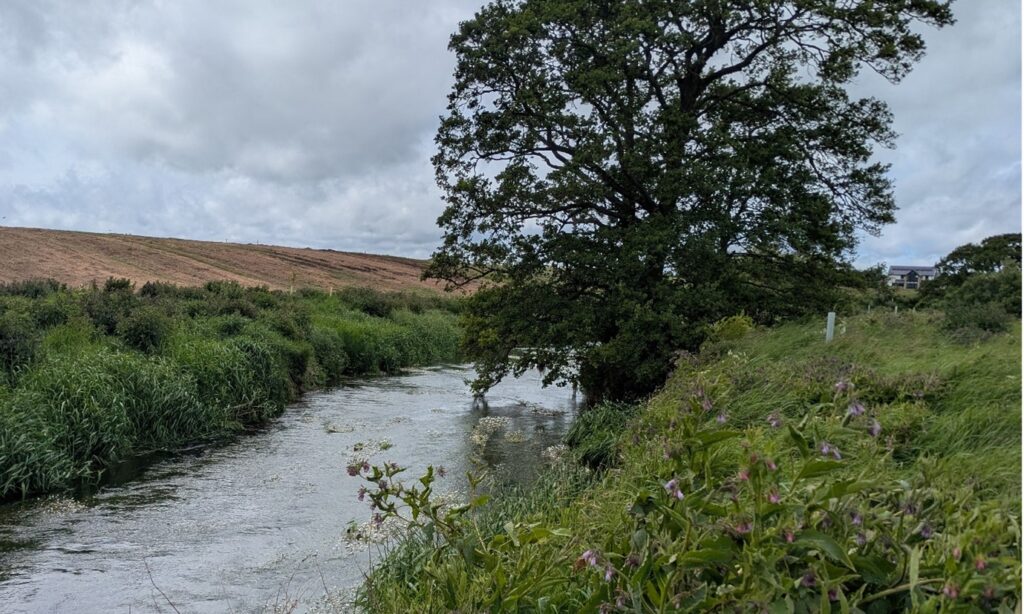New Hutton report reveals need for collaborative work to fight flooding, drought and other issues at River Eden and Motray Water catchments in Fife

A new report from Hutton Scientific Services – the commercial wing of The James Hutton Institute – has revealed the urgent need for collaborative action to tackle flooding, drought, and other water-related challenges in Fife’s River Eden and Motray Water catchments.
The Transition to Delivery: Landowner Engagement project report, developed in partnership with the River Eden Sustainability Partnership (RESP) and funded by Inspiring Scotland’s Neighbourhood Ecosystem Fund, highlights a number of issues – including flooding, drought, ecological degradation, and nutrient pollution – which are increasingly threatening the local environment, agricultural productivity, and community wellbeing.
The catchments, home to rich agricultural landscapes and vibrant rural communities, face mounting pressures from climate change. Recent events, including the December 2023 flooding and the latest significant water scarcity — which can lead to agricultural abstraction suspensions, where farmers are temporarily stopped from taking water from rivers or groundwater to protect depleted natural sources — underscore the vulnerability of water systems. By 2050, significant droughts could occur annually, posing serious risks to food production and water availability.
In response, the project engaged with local landowners to investigate water management solutions. They identified feasible fixes drawn from nature, such as leaky barriers, ponds, wetlands, irrigation lagoons and regenerative agricultural practices. These measures help in mitigating flood and drought risks, work with and enhance the agricultural economy, restore wildlife habitat, and increase biodiversity.

Dr. Kerr Adams of Hutton Scientific Services said: “Landowners are already implementing practices, and there’s an appetite for collaborative solutions that benefit both nature and agriculture. The River Eden Sustainability Partnership is making great strides in bringing local stakeholders together to help start addressing shared water issues.”
“Both the Eden and Motray catchments are facing a mix of water-related pressures, however, it’s clear there are opportunities to build resilience through partnership working.”
.Dr. Kerr Adams, Hutton Scientific Services
The project report proposes a five-year strategy for RESP, focusing on:
- Developing landowner clusters to foster partnership working and knowledge exchange.
- Implementing water attenuation features (landscape elements which slow down and store excess water) to reduce flood and drought impacts.
- Securing innovative funding through Nature Finance Fife to support landscape-scale restoration.
- Expanding citizen science and invasive species control to improve ecological health.
The project demonstrates that effective water management must be rooted in local knowledge and collective action. By aligning environmental goals with agricultural needs, RESP is paving the way for a more resilient and sustainable future for the Eden catchment.
Sarah Davidson, Chair Sustainable Cupar, SCIO, a founding partner in RESP, said, “Sustainable Cupar has been delighted to work with Hutton Scientific Services on this project.
“We are grateful to The Inspiring Scotland Neighbourhood Ecosystem Fund for the main funding to carry out this important work, with additional contributions from Eden Angling Association and Sustainable Cupar.

“The RESP partnership is community-based and volunteer-driven, but now has the support of a wide range of partners including The James Hutton Institute, National Farmers Union Scotland, Tay Rivers Trust and Fife Coast and Countryside Trust, creating a strong, broad, knowledgeable partnership, working together to find ways to improve water quality and habitat on the River Eden and Motray Water catchments in Fife.”
For more information, contact Media Officer, Matteo Bell at matteo.bell@hutton.ac.uk or on 074944 22228.
